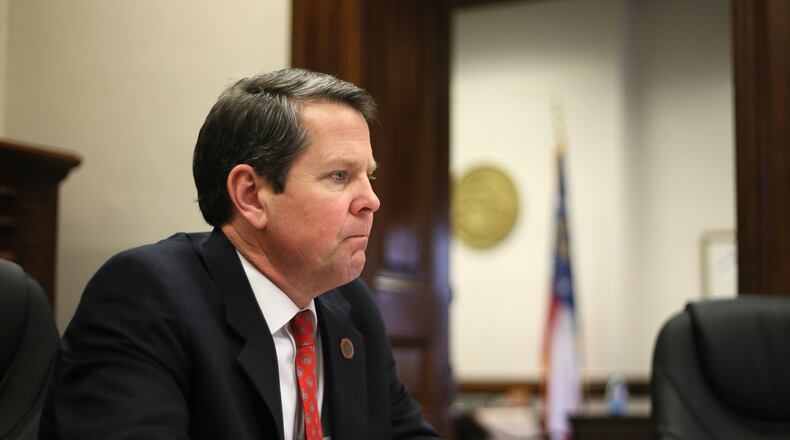Pay of some statewide elected officials
Governor
2015-16: $139,000
2016-17: $139,000
Lieutenant governor
2015-16: $91,600
2016-17: $91,600
Attorney general
2015-16: $137,791
2016-17: $137,791
Secretary of state
2015-16: $123,637
2016-17: $127,346
School superintendent
2015-16: $123,270
2016-17: $126,968
Labor commissioner
2015-16: $122,786
2016-17: $126,470
Source: Office of Planning and Budget
Some of Georgia’s statewide elected officials didn’t follow Gov. Nathan Deal’s lead and accepted pay raises last month.
The problem is, Deal administration officials aren’t so sure the raises are legal.
The state allocated 3 percent more payroll money to provide merit raises to 200,000 teachers and state employees starting July 1. Deal’s office made it clear — when he announced the raises in January and again in a memo to state department heads in May — that the raises were to be doled out based on merit, not uniformly as 3 percent cost-of-living adjustments.
While the difference may seem minor, it’s important when it comes to state law.
Under state law, the salaries of statewide elected officials, such as the attorney general, governor and secretary of state, are set by statute. However, they can receive cost-of-living raises — increases to help keep up with inflation — when the General Assembly doles out money for that purpose.
Deal and his top aides did not take raises, using extra payroll money the General Assembly allocated to give bigger pay hikes to lower-level staffers.
But Georgia Secretary of State Brian Kemp, School Superintendent Richard Woods and Labor Commissioner Mark Butler all got 3 percent raises, state records show.
Teresa MacCartney, the director of Deal’s Office of Planning and Budget, said the raises were never intended for statewide elected officials.
“State law clarifies that the salaries of constitutional officers cannot grow beyond a cost-of-living increase determined by the Office of Planning and Budget,” she said. “However, the Legislature has approved only merit/retention/recruitment increases, not a COLA, for the current fiscal year.
“The governor led by example when he did not grant himself a raise, but separation of powers gives the Legislature and voters the final say in resolving this issue.”
MacCartney said a May 2 letter to statewide elected officials made clear that the raises can “not be used for across-the-board cost-of-living adjustments.”
However, Kemp’s office said that the May memo also discussed cost-of-living raises.
“Secretary Kemp did not authorize a merit-based increase for his salary,” said Candice Broce, Kemp’s spokeswoman. “The increase was related to cost-of-living adjustments as referenced in the OPB memo.”
Meanwhile, Butler, the labor commissioner, said, “I didn’t even know I got a raise.”
He said staffers in his office probably misread the OPB memo and thought everyone in the department was eligible for a raise.
“They are looking at it now and trying to figure out what happened,” Butler said.
Butler said his office can rescind his $3,700 raise if it’s not allowed by law. “It’s easily fixable,” he said.
Matt Cardoza, the chief communications officer for the Department of Education, said Woods’ $3,700 pay raise was a mistake.
“The superintendent’s salary was inadvertently adjusted during the process by which we increased all eligible staff — this was a mass adjustment that we had the State Accounting Office perform for us, but we did not effectively communicate that the superintendent’s salary was not to be changed,” Cardoza said.
Cardoza said Woods’ next paycheck will be reduced to make up for the raise money he’s received but wasn’t supposed to get.
Pay hikes for department heads and top state officials have been a sore spot among the rank-and-file workers because some agency governing boards doled out sizable increases to top brass during the Great Recession while teachers and other state employees were being furloughed or went without raises.
This year, Deal and lawmakers approved the raise money for school districts and state agencies, providing some workers with their first substantial increase since before the Great Recession.
While most state agencies got 3 percent more payroll, larger raises were set aside for employees in jobs that have seen especially high turnover, such as public health nurses and prison guards.
The Atlanta Journal-Constitution reported in May that some school districts are not passing on the full 3 percent.
Others districts are having to raise property taxes to make the raises permanent, or they are giving the extra money as bonuses, rather than raises to a teacher’s base pay.
Meanwhile, some department heads or the panels that govern their agencies sought bigger raises for top brass. The state ethics commission, for example, voted in June to approve a 10 percent raise for the panel's executive secretary.
About the Author
Keep Reading
The Latest
Featured




